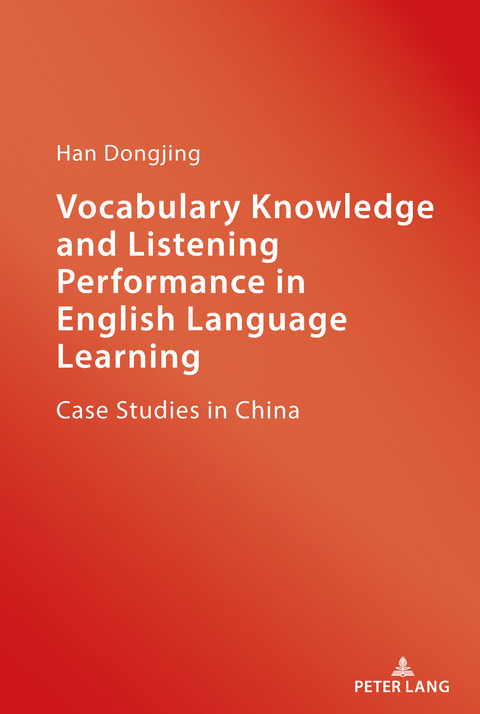
Vocabulary Knowledge and Listening Performance in English Language Learning
Peter Lang Publishing Inc (Verlag)
978-1-4331-6368-5 (ISBN)
The primary aim of this book is to enhance English as a foreign language (EFL) learners’ listening proficiency and provide pedagogical implications for vocabulary and listening teaching practice. This book gives particular attention to mastery of aural vocabulary knowledge to enhancement of listening performance in Chinese context. It provides a comprehensive picture of the role of vocabulary acquisition approaches and strategy practice in listening performance.
This book evaluates the relationship between vocabulary knowledge and listening comprehension in English as a foreign language (EFL), which has not been sufficiently investigated empirically. In particular, it has an added focus on the use of aural vocabulary knowledge tests in detecting the role of vocabulary knowledge in listening comprehension. It highlights the role of vocabulary knowledge in determining listening success. Specifically, it draws scholars’ attention to the contributions of aural vocabulary knowledge to listening comprehension. The study also confirms the previous hypotheses of higher correlations between aural vocabulary size knowledge and listening comprehension. Pedagogically, it confirms the significance and necessity of improving both aural and written forms of vocabulary knowledge and focusing on strategy-embedded listening activities in EFL listening education. In this book, each chapter is dedicated to a specific theme in EFL learning and acquisition, providing a China case study dedicated to further development of EFL education.
Han Dongjing is a senior lecturer in the faculty of Business English at Shenzhen Polytechnic. She received her Doctor of Applied Language Sciences from Hong Kong Polytechnic and is currently pursuing her doctorate in education from the University of Hong Kong.
List of Tables – List of Figures – Preface – Acknowledgments – List of Abbreviations – Introduction – The Scope of the Study – Organization of the Study – Research Review – Vocabulary Knowledge and English Language Learning – Role of Vocabulary Knowledge in Listening Comprehension – Vocabulary Knowledge Incidental Acquisition and Intentional Learning – Dimensions of Vocabulary Knowledge – Vocabulary Knowledge Tests – Listening Comprehension – Nature of Listening Comprehension – Factors Affecting Listening Comprehension – Learning Strategies – Vocabulary Learning Strategies – Listening Strategies – Research Methodology – Initial Research Design – Participants – Participants in the Quantitative Study – Research Design II – Participants in the Qualitative study – Research Design and Procedures – Instruments – Written Vocabulary Size Test – Written Vocabulary Depth Test – Listening Vocabulary Tests – TOEFL Listening Test – Questionnaire of Vocabulary Learning Strategies – Questionnaire of Listening Strategies – Semi-Structured Interviews – Data Collection – Data Analysis – Results and Findings of the Pilot Study – Results of the Pilot Study – Correlation Analysis – Frequency of Learning Strategy Use – Correlation Analysis between Strategy Use and Learning Outcomes – Semi-Structured Interviews – Discussions of the Pilot Study (Research Design I) – Introduction of Research Design II – Findings in Research Design II of the Pilot Study – Summary of the Pilot Study – Limitations of the Pilot Study – Comparing Aural and Written Vocabulary Measures: A Supplementary Study – Major Revisions for the Design of the Main Study – Main Study – Overview – Research Question One – Research Question Two – Research Question Three – Research Design I – Research Question One – Research Question Two – Research Question Three – Summary of Research Design I – Research Design II – Research Question One – Research Question Two – Research Question Three – Qualitative Study: Semi-Structured Interviews – Reports on the Employments of Listening Strategies – Reports on the Employment of Vocabulary Learning Strategies – Discussion – Role of Vocabulary Knowledge in Listening Comprehension – Research Design I – Research Design II – Summary – Comparative Study of the Role of Vocabulary Knowledge in Listening Comprehension in High versus Low EFL Listeners – Role of Learning Strategies in Listening Comprehension – Meta-cognitive Strategies and Listening Comprehension – Learning Strategies and Listening Comprehension – Socio-Affective Strategies and Listening Comprehension – Qualitative Study: Semi-Structured Interviews – Conclusion – Addressing Research Questions and Hypotheses – Theoretical Implications – Methodological Implications – Pedagogical Implications – Vocabulary Knowledge and English Language Learning – Learning Strategy-Embedded Listening Teaching – Limitations of the Study – Directions for Future Research.
| Erscheinungsdatum | 27.11.2019 |
|---|---|
| Zusatzinfo | 65 Illustrations |
| Verlagsort | New York |
| Sprache | englisch |
| Maße | 150 x 225 mm |
| Gewicht | 330 g |
| Themenwelt | Schulbuch / Wörterbuch ► Wörterbuch / Fremdsprachen |
| Geisteswissenschaften ► Sprach- / Literaturwissenschaft ► Anglistik / Amerikanistik | |
| Geisteswissenschaften ► Sprach- / Literaturwissenschaft ► Sprachwissenschaft | |
| ISBN-10 | 1-4331-6368-3 / 1433163683 |
| ISBN-13 | 978-1-4331-6368-5 / 9781433163685 |
| Zustand | Neuware |
| Haben Sie eine Frage zum Produkt? |
aus dem Bereich


